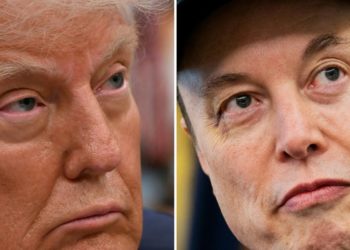In a country that mostly outlaws guns, the front-runner for president has been campaigning for Tuesday’s vote clad in a bulletproof vest and giving speeches behind bulletproof glass.
Lee Jae-myung, the leader of the South Korean Democratic Party, has openly stepped up security to levels rarely seen in a South Korean election.
Early in the campaign season last month, Mr. Lee took off his suit to unveil a white bulletproof vest before slipping on his party’s blue jacket in front of his supporters. During one speech, he was yelled at by supporters imploring him to stay behind protective glass after he briefly stepped outside of its cover. His team has restricted access for journalists and has only allowed a select few to tag along as he toured the nation.
Mr. Lee has reason to be concerned: He survived an attempted assassination last January when a man stabbed him in the neck after approaching him to ask for his autograph, in a worrying sign of how politically polarized the country had become. Last week, the National Police Agency said it had received nearly a dozen reports of online threats to kill Mr. Lee. One has been forwarded to prosecutors, an agency spokesman said.
“Threat levels for this election have been higher than those in the past,” said Professor Yoon Taeyoung, who specializes in terrorism, crisis management and national intelligence at Kyungnam University.
Political violence is rare in South Korea, but there have been high-profile episodes of it. In 2006, former president Park Geun-hye —- who was then a lawmaker — suffered a four-inch cut to her face after a man attacked her with a knife. Her father, the strongman Park Chung-hee, was fatally shot by the chief of the Korea Central Intelligence Agency at a dinner in 1979. Most recently, Song Young-gil, the chief of the Democratic Party at the time, survived an attack to the head with a hammer in 2022.
South Korea has tight laws surrounding firearms: people can only own a gun if it’s required for work such as in the police, military, or security industry, or authorized for hunting.
Kim Moon-soo, the candidate for the People’s Power Party and Mr. Lee’s main rival, has taken a more relaxed approach to security during the campaign.
“I have no need to wear a bulletproof vest,” he said to supporters in Seoul in May, unzipping his jacket to reveal only a shirt underneath. “If there is a situation in which I am shot, then I’ll be shot!” he said.
Mr. Kim has said he wants to decrease the size of his existing security unit, which he says is required to be the same as Mr. Lee’s. Both men have several dozen bodyguards who operate in a three-tiered system.
The police are responsible for providing security to presidential candidates. The role is passed on to the presidential guard after a winner is elected.
Mr. Kim has tried to distinguish himself from Mr. Lee in every way possible, including his attitude toward safeguarding his public appearances, said Professor Yoon. Mr. Kim is “appealing to his supporters that he’s lived an honest life, he has no reason to fear an attack on his life,” the professor said.
In January, the Democratic Party proposed that Mr. Lee wear a bulletproof and knifeproof vest during public appearances in response to multiple online threats to his life. He was seen wearing one during a visit to lawmakers in March who were on a hunger strike calling for the impeachment of former President Yoon Suk Yeol over a failed martial law decree in December. “I feel anxious if I don’t wear it,” he told one lawmaker.
Jeon Hyun-hee, a Democratic Party lawmaker, said in a televised party meeting in May that Mr. Lee had faced repeated threats of terrorism, claiming that Russian-made pistols and sniper rifles had been smuggled into South Korea and agents mobilized to target the candidate.
“Just like U.S. President Donald Trump, who faced an attempted assassination with a gun, we must consider every possible countermeasure including bulletproof glass barriers on all four sides of the campaign stage,” she said.
Polls leading up to the election showed Mr. Lee leading Mr. Kim by more than 10 percentage points.
Jin Yu Young reports on South Korea, the Asia Pacific region and global breaking news from Seoul.
The post Bulletproof Vests and Glass: South Korean Candidate Tightens Security appeared first on New York Times.




